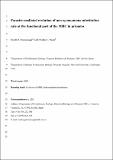| dc.contributor.author | Garamszegi, Laszlo Z. | |
| dc.contributor.author | Nunn, Charles Lindsay | |
| dc.date.accessioned | 2012-02-21T18:50:55Z | |
| dc.date.issued | 2011 | |
| dc.identifier.citation | Garamszegi, Laszlo Z. and Charles L. Nunn. 2011. Parasite-mediated evolution of the functional part of the MHC in primates. Journal of Evolutionary Biology 24(1): 184–195. | en_US |
| dc.identifier.issn | 1010-061X | en_US |
| dc.identifier.issn | 1420-9101 | en_US |
| dc.identifier.uri | http://nrs.harvard.edu/urn-3:HUL.InstRepos:8191224 | |
| dc.description.abstract | The major histocompatibility complex (MHC) is a key model of genetic polymorphism, but the mechanisms underlying its extreme variability are debated. Most hypotheses for MHC diversity focus on pathogen-driven selection and predict that MHC polymorphism evolves under the pressure of a diverse parasite fauna. Several studies reported that certain alleles offer protection against certain parasites, yet it remains unclear whether variation in parasite pressure more generally covaries with allelic diversity and rates of molecular evolution of MHC across species. We tested this prediction in a comparative study of 41 primate species. We characterized polymorphism of the exon 2 of DRB region of the MHC class II. Our phylogenetic analyses controlled for the potential effects of neutral mutation rate, population size, geographic origin and body mass and revealed that nematode species richness associates positively with nonsynonymous nucleotide substitution rate at the functional part of the molecule. We failed to find evidence for allelic diversity being strongly related to parasite species richness. Continental distribution was a strong predictor of both allelic diversity and substitution rate, with higher values in Malagasy and Neotropical primates. These results indicate that parasite pressure can influence the different estimates of MHC polymorphism, whereas geography plays an independent role in the natural history of MHC. | en_US |
| dc.description.sponsorship | Human Evolutionary Biology | en_US |
| dc.language.iso | en_US | en_US |
| dc.publisher | Wiley-Blackwell | en_US |
| dc.relation.isversionof | doi:10.1111/j.1420-9101.2010.02156.x | en_US |
| dash.license | OAP | |
| dc.subject | balancing selection | en_US |
| dc.subject | helminths | en_US |
| dc.subject | host–parasite coevolution | en_US |
| dc.subject | immune defence | en_US |
| dc.subject | immunogenetics | en_US |
| dc.subject | parasitism | en_US |
| dc.subject | phylogenetic comparative methods | en_US |
| dc.title | Parasite-Mediated Evolution of the Functional Part of the MHC in Primates | en_US |
| dc.type | Journal Article | en_US |
| dc.description.version | Accepted Manuscript | en_US |
| dc.relation.journal | Journal of Evolutionary Biology | en_US |
| dash.depositing.author | Nunn, Charles Lindsay | |
| dc.date.available | 2012-02-21T18:50:55Z | |
| dc.identifier.doi | 10.1111/j.1420-9101.2010.02156.x | * |
| dash.contributor.affiliated | Nunn, Charles | |


